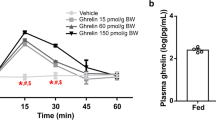Abstract
Obestatin is a recently discovered 23 amino acids peptide derived from the ghrelin gene. As opposed to ghrelin, obestatin was shown to inhibit food intake in mice. The aims of this research were to study the effects of acute obestatin treatment on feeding behavior in the rat and its effects on GH and corticosterone secretion. Our results demonstrate that in young-adult male rats, obestatin effectively blunts the hunger caused by short-term starvation. Obestatin did not modify GH secretion in 10-day-old rats and did not antagonize the GH-releasing effects of hexarelin. Moreover, obestatin administration had no effects on spontaneous corticosterone secretion. In conclusion, these data demonstrate that in young-adult male rats the newly discovered obestatin can inhibit feeding but does not modify GH and corticosterone release in infant rats.
Similar content being viewed by others
References
Zhang JV, Ren PG, Avsian-Kretchmer O, et al. Obestatin, a peptide encoded by the ghrelin gene, opposes ghrelin’s effects on food intake. Science 2005, 5750: 996–9.
Kojima M, Hosoda H, Date Y, et al. Ghrelin is a growth-hormone-releasing acylated peptide fron stomach. Nature 1999, 402: 656–60.
Szentirmai E, Krueger JM. Obestatin alters sleep in rats. Neurosci Lett 2006, 1–2: 222–6.
Wren AM, Seal LJ, Cohen MA, et al. Ghrelin enhances appetite and increases food intake in humans. J Clin Endocrinol Metab 2001, 12: 5992.
Wren AM, Small CJ, Abbott CR, et al. Ghrelin causes hyperphagia and obesity in rats. Diabetes 2001, 11: 2540–7.
Steiger A. Sleep and endocrinology. J Intern Med. 2003, 1: 13–22.
van der Lely AJ, Tschop M, Heiman ML, Ghigo E. Biological, physiological, pathophysiological, and pharmacological aspects of ghrelin. Endocr Rev 2004, 3: 426–57.
Giordano R, Picu A, Broglio F, et al. Ghrelin, hypothalamus-pituitary-adrenal (HPA) axis and Cushing’s syndrome. Pituitary 2004, 4: 243–8.
Torsello A, Luoni M, Schweiger F, et al. Novel hexarelin analogs stimulate feeding in the rat through a mechanism not involving growth hormone release. Eur J Pharmacol 1998, 2–3: 123–9.
Deghenghi R, Cananzi MM, Torsello A, Battisti C, Muller EE, Locatelli V. GH-releasing activity of Hexarelin, a new growth hormone releasing peptide, in infant and adult rats. Life Sci 1994, 18: 1321–8.
Pan W, Tu H, Kastin AJ. Differential BBB interactions of three ingestive peptides: obestatin, ghrelin, and adiponectin. Peptides 2006, 4: 911–6.
Petrovich GD, Gallagher M. Amygdala subsystems and control of feeding behavior by learned cues. Ann NY Acad Sci 2003, 985: 251–262.
Solomon A, De Fanti BA, Martinez JA. The nucleus tractus solitari (NTS) participates in peripheral ghrelin glucostatic hunger signalling mediated by insulin. Neuropeptides2006, 3: 169–7
Gilg S, Lutz TA. The orexigenic effect of peripheral ghrelin differs between rats of different age and with different baseline food intake, and it may in part be mediated by the area postrema. Physiol Behav 2006, 2: 353–9.
Author information
Authors and Affiliations
Corresponding author
Rights and permissions
About this article
Cite this article
Bresciani, E., Rapetti, D., Donà, F. et al. Obestatin inhibits feeding but does not modulate GH and corticosterone secretion in the rat. J Endocrinol Invest 29, RC16–RC18 (2006). https://doi.org/10.1007/BF03344175
Accepted:
Published:
Issue Date:
DOI: https://doi.org/10.1007/BF03344175




